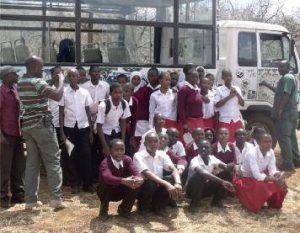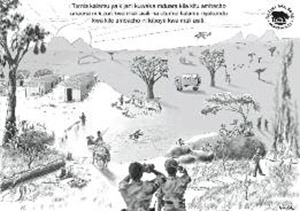Environmental Education Programme – “Rafiki wa Faru”

Students arrive into Mkomazi on the ‘Rafiki wa Faru’ bus

The Environmental Education centre and lunch area

Evaluation drawing on conservation in Mkomazi National Park, produced by Chester Zoo
This very important programme has made tremendous progress in the last year. We were once again able to bring in over 850 students, teachers and community leaders to see the work in the field and to participate in a tightly structured day.
We continue to cover the four main issues identified as important to The Mkomazi Project: habitat restoration of Mkomazi National Park; water conservation; the black rhino breeding programme; and the wild dog breeding programme. Dr Maggie Esson has continued to advise on the choreography of the day and, together with her team in the education department at Chester Zoo, has produced reports on the progress the project is making. Maggie also ran a basic education evaluation course at the Latin American Zoo Educators’ annual conference in August 2012, just after the end of the reporting period, so the methodology is being rolled out to other zoos and field programs. Cathy Dean of Save the Rhino continues to prepare the fundraising proposals and subsequent reporting, and we are really grateful for her commitment to this project.
A series of wildlife environmental clubs have been created at some of the schools that we work with, as a direct result of their field trips into Mkomazi. The students and teachers at these schools have made up their own songs about Mkomazi and now sing them on their way home. The pupils remain amazed at the electric fence, the armed guards at the gates of the Sanctuary and at the courage and fitness of the trackers. They enjoy looking at the pictures and reading the informative signs about rhinos (produced by Chester Zoo) that are now up in the bunker.
Chester Zoo designed, printed and shipped 3,000 more activity books. The Swahili version is handed out to all the students and the English version is handed out to teacher groups, VIPs or TANAPA Trustees. These books are a wonderful addition to the programme and it is always heartening to see how gratefully they are received and how thoroughly they are read.
So overall, the Rafiki wa Faru programme is running very well and is greatly enjoyed by the students. They convey their experiences, amazement and enjoyment of the day to their families when they go home. This demonstrates the legacy of this programme as the years go by. We are very pleased that the Community Conservation Wardens of TANAPA have looked at depth at this programme and are keen to adapt it to other parks.


